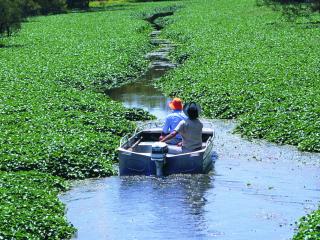Safe disposal of unwanted plants
Garden rubbish should never be dumped. Much of it contains seeds, bulbs, corms, runners and other plant parts capable of regenerating. In drier areas, succulent plants from garden waste will survive and multiply.
When taking a trailer of garden rubbish to the tip, cover the top with a tarpaulin and tie securely at each corner to contain everything as you drive.
During green waste street collections many people scavenge from front verges, so be careful what you put out. If you have thinned out agapanthus, for example, the next person who picks it up may not be responsible about dead-heading, so it might be wiser to bin the plant.
If you are decommissioning a pond or getting rid of an aquarium, either put the aquatic plants on the compost heap or bin them in sealed plastic bags, instead of discarding them in the local creek or river as they can become invasive like the Hydrocotyl (Hydrocotyle ranunculoides) in the above photograph.
When composting garden waste, avoid adding anything with seed-heads, or place the seed heads in a black plastic bag and leave in the sun for two months to kill the seeds before composting
If you see someone dumping garden waste in the bush, make a note of their vehicle registration
if possible and report it to the local council or telephone the Keep Australia Beautiful Council’s illegal dumping hotline 1300 766 541.

